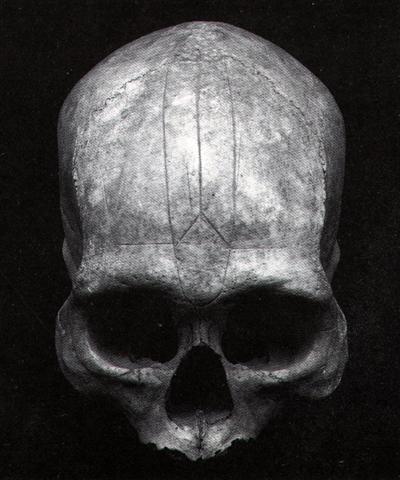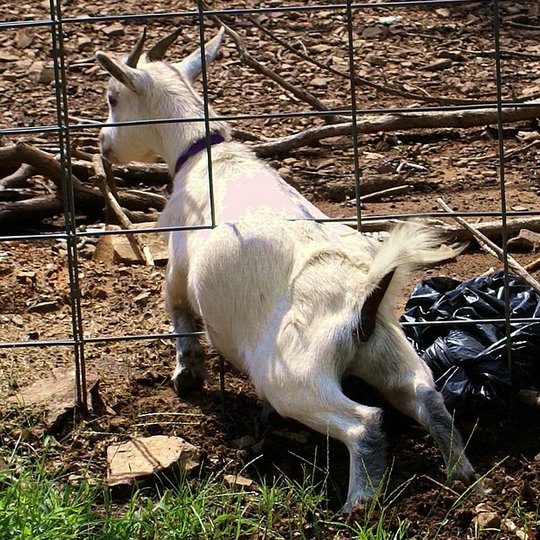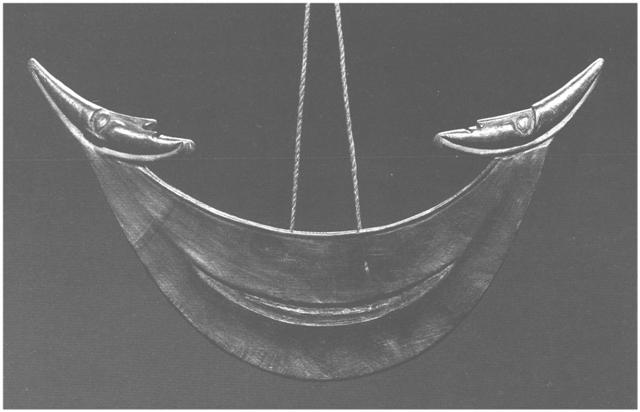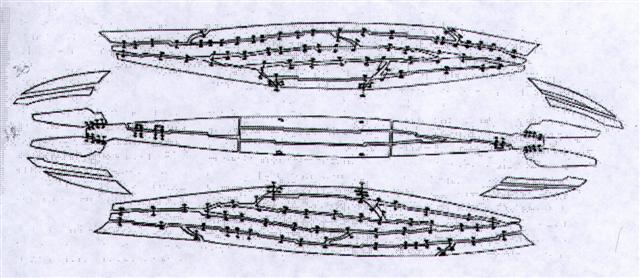Translation according to Barthel:
|
E:5 |
|
i te tau i a
Ataranga.he
tuku te tangata i te
vaka |
During the time of Ataranga, the people
built boats, put them into the water, went on board, and
sailed off (across the sea) to find a land where people
could (safely) live. During the
time of Taana, Taana spoke to his three sons: 'Untie
your boat, fellows! Sail away and look for the land
where the great king can live (safely in the
future)!'The boat anchored in front of the three
(islets) Motu Nui, Moto Iti, and Motu Kaokao. They had
sailed away and had looked for the (new) land, but the
boat did not return to its homeland, Maori.
Many people perished during the time
of Taana. Taana spoke to his assistants (titiro):
'Pick up the keel and lay it down (at the building site)
and construct a boat (miro), young men! The boat
shall be for the people (mahingo) and also for
the king, so that we can all set out and look around to
see whether there isn't (somewhere) (the possibility of)
escape for the people''
They built the boat during the time of
Taana. Thus, everything remained (in its place) until
Taana died.
Taana passed on his royal power to
Matua. Matua established himself (as ruler). They built
boats during the time of Hotu. |
|
he hoa he piki he oho he kimi i te kainga
mo noho o |
|
te tangata.i
te tau i a Taana. he kī a Taana.ki ta- |
|
ana ngaio.hokotoru.ka
hoa tokorua vaka e ngaio |
|
nei e.ka oho ka kimi te kainga
mo noho o te ariki |
|
nui. he hoa i te vaka a Motu nui.a
totoru ko motu iti |
|
ko motu kaokao.he oho he ui i te kainga.kai
hoki ho(-) |
|
koou ki tona kainga.ki
maori. ai te piere tangata
ko où nKito ona kaiga.
kimà òri, ai te piere
tagata |
|
e oko era.i te tau i a Taana.he ki a
Taana.ki to(-) eoko era.
ite tau i a Taana. heki Ataaua.
Kito |
|
ona titiro.Ka too mai te tino a
hakamoe ki tuku te ona
titiro. katoo mai tetiuo
kahaka moe kituku te |
|
miro e kau a repa ē.mo te mahingo.mo
te ariki tokoa miro e kau
are paè. mo te mahigo. mo te ariki tokoa |
|
ki ōho tatou ki ui ina hē terenga
o te mahingo.he tu(-)
kiǒ ho. tatou kiui ina hè
terega ote mahigaó. hetu |
|
ku i te miro. i te tau i a Taana.he
noho he noho he |
|
mate a Taana. he avai i te pahera
ariki e taana mate a
Taana. hea vai tepa hera ariki.
e.taana |
|
kia Matua.he noho a Matua.he tuku i te
miro |
|
i te tau i a Hotu.he moe a hau maka.i
taana |
|
atua o te po.he oho mai te kuhane o
hau maka.a ro- |
See
at page E:6 |
|
to i te raā i ka mana mai te kuhane o
hau maka |
I have bluemarked where the story about the voyage of
the dream soul (kuhane)
of Hau Maka is beginning. Its translation
ought to come together with the beginning of that for
page
E:6.
Given a cosmological frame of mind we can
perceive how the inundation foreseen by Moe
Hiva and beginning in the time of Roroi
motivated people to build boats.
|
ko oto uta |
ariki motongi |
1 |
|
ko tangaroa.a oto uta |
ariki motongi |
2 |
|
ko tiki hati.a tangaroa |
ariki motongi |
3 |
|
ko roroi.a tiki hati |
ariki motongi |
4 |
|
ko tuu kumā.a roroi |
ariki motongi |
5 |
|
ko ataranga.a tuu kumā |
ariki motongi |
6 |
|
ko harai.a ataranga |
ariki motongi |
7 |
|
ko taana.a harai |
ariki motongi |
8 |
|
ko matua.a taana |
ariki motongi |
9 |
|
ko hotu.a matua |
ariki motongi |
10 |
|
E:3 |
|
he noho a moe hiva.he
hakatopa i roto i a ia. |
Moe Hiva sat down and
thought intensely. |
he ki
ana. he tohu. ki te ariki. kia o oto
uta.e |
Then he made a prediction
for the King Oto Uta. This was his
prediction: 'There will come a time when
the land will sink into the sea.' |
|
moe hiva.penei i tohu
ai. Na te tau he emu |
|
te kainga. ka oho ena. |
|
ko moe hiva.katahi
kohou tohu. |
Moe Hiva was the first
prophet (kohou tohu, literally,
'staff of prophecy'); Tuku Maura was the
second one; Ngerani, the third one; Po,
the fourth one; and Henga, the fifth
one. |
|
ko tuku maura.karua
kohou tohu. |
|
ko ngerani.katoru
kohou tohu. |
|
ko po.kahā. kohou
tohu. |
|
ko henga.karima. kohou
tohu. |
|
E:4 |
|
I te au i a roroi
i pari mai ai te vai ki runga ki te |
During the time of
Roroi, the waves rose and the water
(of the sea) flooded the land. It
rose during the time of Tuu Kuma,
during the time of Ataranga, during
the time of Harai, during the time
of Taana, during the time of Matua,
and during the time of Hotu. |
|
kainga. he ea mai
ki te tau i a tuu kuma.ki te |
|
tau i a
Ataranga.ki te tau i a Harai.ki te
tau i a |
|
Taana.ki te tau i
a Matua.ki te tau i a Hotu. |
|
i te tau i a
Roroi.he pari mai te vai ki runga ki
te |
During the time of
Roroi, the water flooded the land
and killed a great number of Roroi's
people. The time of the rule of Tuu
Kuma drew near. During the time of
Tuu Kuma, Tuu Kuma spoke: 'Because
of (?) Roroi, misfortune has come to
many of Tuu Kuma's people.' |
|
kainga.he tā i te
piere.tangata. o Roroi, he ea |
|
mai ki te tau i a
Tuu kumā. i te tau i a Tuu ku- |
|
mā.i ki nei a Tuu
kuma.ko roroi. ko te haka |
|
ere.o te piere o
Tuu kuma. |
|
Roro.
Head, skull, brain. T Pau.:
taka-roro, headache. Mgv.:
roro, the head, the cranium,
milk, coconut milk. Mq.: roro,
óó, brains. Ta.: roro,
id. There are three senses in this
word ... 1. Coconut milk, as in
Mangareva, a Proto-Samoan
signification; note that coconut
milk employed by writers who know
the South Sea does not mean the
natural water within the nut, which
is limpid, but is a tincture
obtained by maceration of the
bruised kernel, which is white and
heavy and thickens to a custardy
consistency when cooked. 2. The
Tongafiti sense is the brain,
palpably the soft contents of the
calvarium, sometimes very soft
indeed; this sense is lacking to
Mangareva but is found in Rapanui.
3. A designation of the hard part of
the head, found only in Mangareva
and Rapanui, so violently sundered
from the germ sense underlying 1 and
2 as to indicate confusion with a
stem of similar form but diverse
meaning. Churchill. Mgv.: Roroi,
to milk, to squeeze or press with
the hands. Mq.: oi, to milk,
to knead, to dilute. Sa.: loloi,
taro kneaded with coconut water.
Ma.: roroi, to grate to a
pulp. Churchill.
 |
The first text line on page E:5 defines the
new topic - i te tau i a
Ataranga.he
tuku te tangata i te
vaka - boats were built.
... Väinämöinen set about
building a boat, but when it came to the
prow and the stern, he found he needed three
words in his rune that he did not know,
however he sought for them. In vain he
looked on the heads of the swallows, on the
necks of the swans, on the backs of the
geese, under the tongues of the reindeer. He
found a number of words, but not those he
needed. Then he thought of seeking them in
the realm of Death, Tuonela, but in vain. He
escaped back to the world of the living only
thanks to his potent magic. He was still
missing his three runes. He was then told by
a shepherd to search in the mouth of Antero
Vipunen, the giant ogre. The road, he was
told, went over swords and sharpened axes.
Ilmarinen made shoes, shirt and gloves of
iron for him, but warned him that he would
find the great Vipunen dead. Nevertheless,
the hero went. The giant lay underground,
and trees grew over his head. Väinämöinen found his way to the giant's mouth, and
planted his iron staff in it. The giant
awoke and suddenly opened his huge mouth. Väinämöinen slipped into it and was
swallowed. As soon as he reached the
enormous stomach, he thought of getting out.
He built himself a raft and floated on it up
and down inside the giant.
|
Te ragi |
tagata - ragi |
kua hakagana - ki te maro |
 |
 |
 |
|
Cb5-1 (392 + 95) |
Cb5-2 |
Cb5-3 |
|
CLOSE TO THE SUN: |
|
Jan 20 (385) |
21 |
22 |
|
SHANG WEI (Higher Guard) = κ
Cephei
(305.2), θ Sagittae (305.4),
TSEEN FOO (Heavenly
Raft)
= θ Aquilae (Ant.)
(305.6), ξ Capricorni (305.8)
*264.0 = *305.4 - *41.4 |
TSO KE (Left Flag) = ρ Aquilae
(306.3) |
GREDI
(Goat) = α Capricorni
(307.2), σ Capricorni (307.5),
ALSHAT (The Sheep) = ν
Capricorni
(307.9) |
|
'Dec 24 (CHRISTMAS EVE) |
25 |
26 (360) |
|
"Dec 10 (*264.0 = *305.4 -
*41.4) |
11 (345) |
12 |
|
NOV 17 (321 = 385 - 64) |
18 |
19 |
|
DAY 305 (= 321 - 16) |
306 |
307 |
 |
|
CLOSE TO THE FULL MOON: |
|
8h (121.7)
χ Gemini (121.0),
NAOS
= ζ Puppis
(121.3) |
ρ
Puppis (122.0),
HEAP OF FUEL =
μ
Cancri
(122.1),
ζ
Monocerotis (122.3), ψ
Cancri (122.6),
REGOR (Roger backwards) =
γ
Velorum
(122.7) |
TEGMINE = ζ Cancri
(123.3) |
|
July 20 |
21 (202) |
22 (22 / 7 → π) |
|
'June 24 (DAY OF ST JOHN) |
25 (202 - 26) |
26 (177 = 6 * 29½) |
|
"June 9 (*121 - *41 = *80) |
10 (161) |
11 |
|
MAY 17 (*121 - *64 = *57) |
18 (138 = 202 - 64) |
19 |
|
DAY 121 (= 11 * 11) |
122 |
123 |
.jpg) |
The giant felt tickled
and told him in many and no uncertain words
where he might go, but he did not yield any
runes. Then Väinämöinen built a smithy and
began to hammer his iron on an anvil,
torturing the entrails of Vipunen, who
howled out magic songs to curse him away.
But Väinämöinen said, thank you, he was very
comfortable and would not go unless he got
the secret words. Then Vipunen at last
unlocked the treasure of his powerful runes.
Many days and nights he sang, and the sun
and the moon and the waves of the sea and
the waterfalls stood still to hear him. Väinämöinen treasured them all and finally
agreed to come out. Vipunen opened his great
jaws, and the hero issued forth to go and
build his boat at last ...
I have no glyph type for vaka and
Metoro used this word curiously seldom - for
surely a Polynesian should often have
remembered their great sea-going vessels. One instance, though,
ought to be
mentioned:
 |
 |
 |
 |
 |
|
Ba1-1 |
Ba1-2 |
Ba1-3 |
Ba1-4 |
Ba1-5 |
|
Ka tuu i te Ragi - ki te
henua e rua - no Hoatumatua - ka
hakanohoa |
|
Hoa. 1.
Master, owner; tagata
hoa papaku, owner or
relative of a dead; hoa manu,
'bird master', that is, he who
received the first egg at the
annual festivals in Orongo;
he to'o mai e te hoa manu i
te mamari ki toona rima, he
ma'u, he hoko, the 'bird
master' receives the egg in his
hand and carries it, dancing.
2.Friend,
companion: e ga hoa ê! 3. To cast away, to throw
away, to abandon, perhaps
also to expel. 4. To
confess a sin; he hoa i te
ta'u: term used of a
category of rongorongo
boards (see ta'u).
Vanaga. 1. Friend; repa hoa,
friend (male), comrade,
companion, fellow; to confide;
repa hoa titika, faithful
friend; garu hoa, friend
(either sex); uha hoa,
friend (female); hoa kona,
native T. 2. To abandon, to
debark, to cast, to launch, to
anchor, to let go, to give up,
to reject, to repudiate, to
suppress, to cut off, to jerk
out, to proscribe, to reprove;
hoahoa, to upset, to
destroy. Churchill. |
 |
 |
 |
 |
 |
|
Ba1-6 |
Ba1-7 |
Ba1-8 |
Ba1-9 |
Ba1-10 |
|
ki te hito o te ragi - ki te
henua - te atariki - ki te henua
- ki tona henua |
 |
 |
 |
 |
|
Ba1-11 |
Ba1-12 |
Ba1-13 |
Ba1-14 |
|
kua
tere te vaka - ki
tona tahina - mai tae atu ki
te tamaiti - koia |
The shape of the Moon crescent looks
like a canoe which in principle
might have inspired Metoro to here
mention that a canoe was due to set
off (tere) - after 10 initial
glyphs.
Tere. 1. To run, to flee,
to escape from a prison. 2. To sail
a boat (also: hakatere);
tere vaka, owner of a fishing
boat. 3. (Deep-sea) fisherman;
tere kahi, tuna fisherman;
tere ho'ou, novice fisherman,
one who goes deep-sea fishing for
the first time. Penei te huru
tûai; he-oho te tere ho'ou ki ruga
ki te hakanonoga; ana ta'e rava'a,
he-avai e te tahi tagata tere vaka i
te îka ki a îa mo hakakoa, mo
iri-hakaou ki te hakanonoga i te
tahi raá. The ancient custom was
like this: the novice fisherman
would go to a hakanonoga; if
he didn't catch anything, another
fisherman would give him fishes to
make him happy so he'd go again one
day to the hakanonoga (more
distant fishing zones where larger
fishes are found). Vanaga. To
depart, to run, to take leave, to
desert, to escape, to go away, to
flee, fugitive, to sail, to row, to
take refuge, to withdraw, to
retreat, to save oneself; terea,
rest, defeat; tetere, to beat
a retreat, to go away, refugee;
teretere, to go away, hurrah;
hakatere, to set free, to
despatch, to expel, to let go, to
liberate, to conquer, helmsman;
terega, departure, sailing;
teretai, a sailor. Churchill.
Possibly my glyph type ragi
illustrates the 'canoe of the Moon'
journeying behind the top of a Tree:
|
 |
 |
 |
 |
 |
|
ragi |
Cb5-1 |
Cb5-2 |
Ba1-1 |
Ba1-6 |
|
Ragi. Ra'i,
T. 1. Sky. 2. Palace. 3.
Prince. Henry. 1. Sky,
heaven, firmament;
ragi moana, blue
sky. 2. Cloud;
ragipuga, cumulus;
ragitea, white,
light clouds; ragi
poporo, nimbus;
ragi hoe ka'i cirrus
(literally: like sharp
knives); ragi viri,
overcast sky; ragi
kerekere, nimbus
stratus; ragi
kirikiri miro,
clouds of various
colours. 3. To call, to
shout, to exclaim.
Vanaga. 1. Sky, heaven,
firmament, paradise;
no te ragi,
celestial. 2. Appeal,
cry, hail, formula, to
invite, to send for, to
notify, to felicitate,
precept, to prescribe,
to receive, to summon;
ragi no to
impose; ragi tarotaro,
to menace, to threaten;
tagata ragi,
visitor; ragikai,
feast, festival;
ragitea, haughty,
dominating. 3.
Commander. 4. To love,
to be affectionate, to
spare, sympathy, kind
treatment; ragi kore,
pitiless; ragi nui,
faithful. Churchill.
Modoc, a language
used on the northwest
coast of North America:
'A single word, lagi,
was used both for the
chief and for a rich man
who possessed several
wives, horses, armour
made of leather or
wooden slats,
well-filled quivers and
precious firs. In
addition to owning these
material assets, the
chief had to win
military victories,
possess exceptional
spiritual powers and
display a gift for
oratory.' (The Naked
Man) |

In text line 12 on page E:5 (line 62
counted from the beginning) a departure (terega)
is mentioned:
ki ōho tatou ki ui ina hē terenga o te
mahingo.he tu(-)
kiǒ ho.
tatou kiui ina hè terega ote
mahigaó. hetu
| He,
article, also verbal
prefix. Hé,
where? I hé,
where; ki hé,
whereto; mai hé,
wherefrom. Vanaga.
Article. P Mgv., Mq.:
e, the. Sa.: se,
id. Churchill. Pau.:
He, false, crooked.
Mgv.: hehe,
crazy, to wander. Ta.:
he, error. Mq.:
he, confusion.
Sa.: sesē, wrong.
Ma.: he, a
mistake. Churchill.
Mgv.: He, a
locust pest of coconuts.
Ta.: he,
caterpillar. Mq.: he,
grasshopper. Sa.: se,
id. Ma.: whe,
caterpillar. Churchill. |
|
PAGES |
|
1 |
2 |
3 |
4 |
5 |
|
15 |
|
DOTS |
|
16 |
23 |
22 |
18 + 1 |
20 + 9 |
|
16 |
39 |
61 |
79 + 1 |
99 + 10 |
|
109 = 80 + 29 = 79 + 30
= 99 + 10 |
|
LINES |
|
14 |
17 |
9 |
6 + 4 |
12 + 6 |
|
68 = 46 + 16 + 6 |
The number of dots on page E:5 are
distributed as follows:
|
1 |
2 |
3 |
4 |
5 |
6 |
7 |
8 |
9 |
10 |
11 |
12 |
|
1 |
0 |
3 |
2 |
1 |
2 |
2 |
2 |
3 |
1 |
2 |
1 |
|
1 |
1 |
4 |
6 |
7 |
9 |
11 |
13 |
16 |
17 |
19 |
20 |
|
13 |
14 |
15 |
16 |
17 |
18 |
|
2 |
1 |
2 |
2 |
2 |
0 |
|
22 |
23 |
25 |
27 |
29 |
29 |

|





.jpg)







